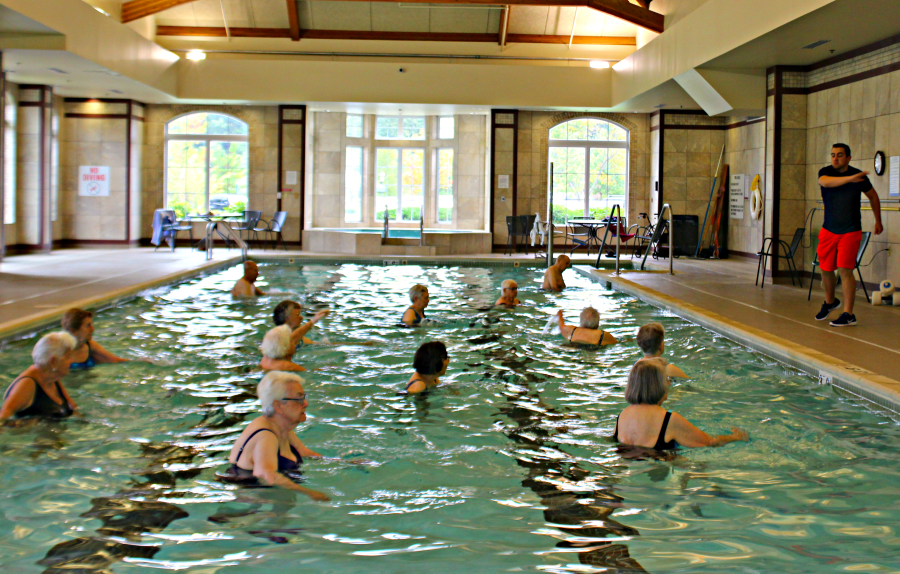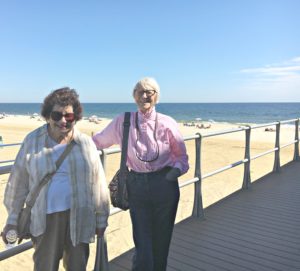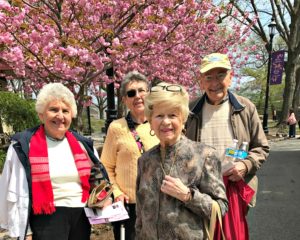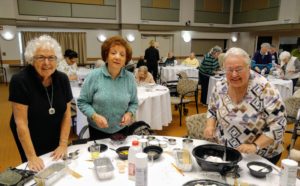How to Avoid Senior Isolation

Solutions to combat loneliness in seniors
By Eric Eichhorst
The holiday season at Applewood means that our continuing care community in Freehold, NJ, is bustling around even more so than usual. This is time of year brings friends and family members from near and far. Parties and festivities can also be found around nearly every corner. Music is truly in the air, and our seniors are right in the middle of it all. However, the holiday seasons can be very hard on a lot of people, both young and old. Between end-of-year stress, general family dysfunction, and the increasingly cold and dark nights it’s very easy for us to feel less than merry. In particular, the month of December can be very hard for those who deal with trying family dynamics, loss, divorce, mental health issues, and most concerningly, loneliness. The elderly in particular are very susceptible to experiencing isolation and loneliness throughout the holidays, but it’s not just the holiday season that compounds loneliness in seniors.

In fact, “One of the deciding factors in seniors and their families choosing a continuing care retirement community (CCRC) is the ease and availability of social activities which help to offset isolation,” says Keith Grady, executive director at Applewood. “Time and again, science has proven that seniors who do not socialize regularly face more health problems, including depression, heart disease and chronic disease risk.” One of the risks of sustained isolation is that parts of the brain will atrophy if they’re not used consistently. Ironically, when older Americans need more cognitive stimulation, they often get less, since they’re no longer in the workplace and friends and family members have moved far away or passed away. Older Americans may also have suffered from age-related changes, such as hearing loss or loss of vision, may find it even more difficult to communicate with others. Sometimes this leads seniors to feel that it isn’t worth the effort when they reach this point.
Seniors Living Single
The number of retired people living solo is expected to reach one in four of the 76 million baby boomers, meaning as many as 19 million seniors could become socially isolated. That number includes older adults who have an out-of-state family, limited connections in retirement–and simple issues of mobility. But if you have a single or widowed senior parent or loved one, you already know how challenging it can be to nudge them into ‘getting out there’ and being social.
But it’s necessary.
The consequences of prolonged loneliness can have a profound on the health and wellbeing of a senior, not just from a mental perspective in that the fulfilling personal relationships are found to be lacking, but loneliness can have a physical impact on a person as well. For example, one University of California, San Francisco (UCSF) study found that participants who were 60 years old and older and had reported feeling lonely saw a 45% increase in their risk of death. Respondents also had a 59% greater risk of mental and physical decline compared to their more social counterparts. This decline then directly affected the participant’s abilities to actually perform basic activities of daily living — or activities that are essential for independent living. In essence, this study suggests that loneliness on its own has the potential to significantly accelerate a senior’s need for long-term care or assistance.
Loneliness truly can have a devastating impact on a senior’s general wellbeing. Aside from the mental toll taken,  stress can impact the body in a similar way that chronic stress might. It can raise levels of cortisol, a stress hormone, which then impairs immune responses and can lead to inflammation, mental illness, and even heart disease and diabetes. The Journal of the American Medical Association Psychiatry even suggests that loneliness may be associated with the development of biomarkers associated with preclinical Alzheimer’s disease. However, the scariest aspect of loneliness is that it is contagious as it is a learned behavior. Researchers have found that a solitary senior may have a tendency to further isolate themselves through pushing others further away from them and to cease making efforts to engage with others. Then, the few individuals who the lonely senior interacts with are likely to develop the same habits and follow the same path of social exclusion.
stress can impact the body in a similar way that chronic stress might. It can raise levels of cortisol, a stress hormone, which then impairs immune responses and can lead to inflammation, mental illness, and even heart disease and diabetes. The Journal of the American Medical Association Psychiatry even suggests that loneliness may be associated with the development of biomarkers associated with preclinical Alzheimer’s disease. However, the scariest aspect of loneliness is that it is contagious as it is a learned behavior. Researchers have found that a solitary senior may have a tendency to further isolate themselves through pushing others further away from them and to cease making efforts to engage with others. Then, the few individuals who the lonely senior interacts with are likely to develop the same habits and follow the same path of social exclusion.
Combatting Senior Social Isolation
There are a number of different strategies available to seniors and caretakers to combat loneliness in seniors and most can be implemented relatively easily, as long as the effort is put in to make it happen. One of those strategies can simply be to change where you call home.
“CCRC living is perfectly suited to single seniors because you live with a group of peers who come from the same era and can relate to the issues which are important to you,” says Wanda Garrin, Applewood’s Engaged Living™ lifestyle coordinator. “You will also meet interesting and diverse people here who have lived in different parts of the U.S. and the rest of the world.” Wanda adds that residents at Applewood have the freedom to choose the level of engagement that is right for them. “Some seniors are busy from dawn to dusk, every day,” Wanda explains. “Others feel more comfortable participating in a few clubs and attending our monthly cocktail party.”
Unfortunately, the solution isn’t just as simple as “move to a CCRC”. Sometimes this isn’t an option for seniors, and sometimes seniors at CCRC’s need more than just other humans around them. Some common strategies include the following:
- Taking a class
- Starting a hobby
- Group exercise
- Get a pet
- Get involved in the community
- Dine with others
- Make interactions with friends and families a top priority
Applewood Residents are encouraged to Pursue Your Hobbies& Share Your Passion!
At Applewood we do much more to combat senior isolation than just encourage our residents to be more social. Our CCRC program is designed to provide residents with an array of amenities, activities, and events developed by both our residents and our staff to help combat senior loneliness by providing an engaging living experience.
“Feeling valued and helpful to others is part of our human makeup,” says Joan Cinque, manager of resident services. “That’s one of the reasons we have so many community services projects in place, making it easy for residents to get involved.” Joan says Applewood transports residents to and from community outreach efforts, including the Tools-4-Schools project where residents help out in local school classrooms each week — just one of the options residents have available to them to stay active.
Enjoying Retirement in Relaxed Elegance
Living retirement life well at Applewood means a safe and comfortable community that offers a wealth of mind, body and spirited-focused activities and special events to nurture a rich senior experience.

From enlightening cultural excursions on dark winter days to invigorating treks to the Jersey Shore during the balmy days of summer, we make senior living easy, exciting, uplifting, and most importantly: social.
We’d love to tell you more. Follow us on Facebook and call us at (732) 303-7416 to make plans to tour our community, model apartments and cottage home.
At Applewood, we believe that retirement is the most exciting time of life.